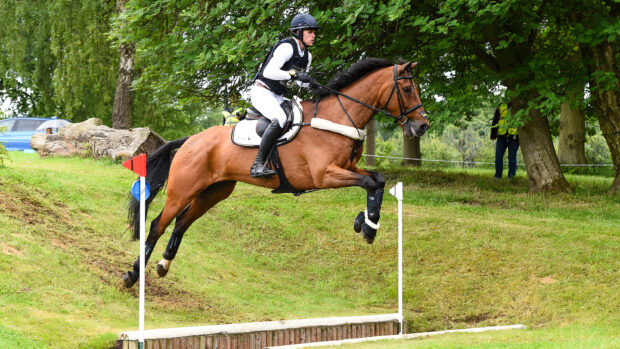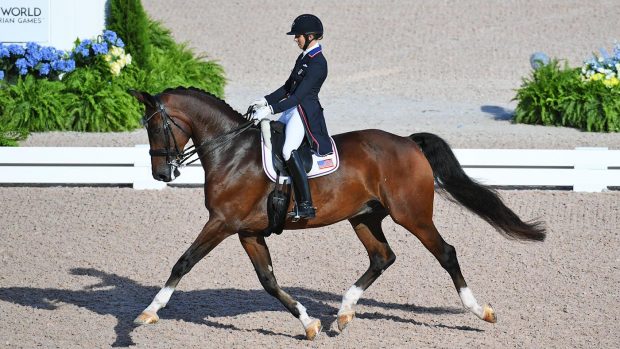A judge has accused witnesses for the RSPCA of having a “hidden agenda”, as he cleared an owner of “impeccable” character of welfare charges her vets said throughout should never have been brought.
Judge Pattinson found Kirsten Fock innocent of all four charges brought against her by the RSPCA, at Aldershot Magistrates Court on 6 December after a trial.
The charity seized 24 of her horses last October; two were put down at Kirsten’s premises – “because they said otherwise they’d just kill them after they’d taken them,” Ms Fock told H&H – and more soon afterwards.
By 9 December, Ms Fock, represented throughout by Kate Chidgey from Bedford Row chambers, had not been told when the nine remaining horses would be returned to her; she was told the others may have been rehomed – before the case had concluded.
“This case has caused an enormous amount of distress to the defendant,” Judge Pattinson said in his verdict. “Within a very short time of seizure by the RSPCA, decisions had been taken to euthanise Anjuska and Ophelia.
“Anjuska was euthanised following a minor procedure carried out by an RSPCA vet; Ophelia was euthanised after taking account, according to Dr Burrows, of the age of the horse, poor prospects of rehoming and the chronic long-term condition from which she was suffering.
“Two more equines, Tanne and Lavinia, were euthanised by Dr Marques, the defendant’s own vet, because the alternative was being taken away by the RSPCA on an uncomfortable journey with inevitable death at the end of it. The defendant felt that she had no choice in this matter.”
The judge had heard that an RSPCA investigator visited Ms Fock’s premises on 3 October 2023, then returned with two vets appointed by the RSPCA on 6 October, when the horses were seized.
The first charge referred partly to a 32-year-old pony called Anjuska, whom the RSPCA vet said was “very lame”, although her treating vet had no concerns about lameness.
“Sadly, Anjuska died within a day or two of seizure by the RSPCA following routine dental treatment and a choke,” the judge said. “[Expert vet witness David] Rendle’s opinion was that there was no other explanation for her death than a ruptured oesophagus, caused by treatment carried out by RSPCA vets. The implication of this is that she might still be alive if not seized by the RSPCA.”
The prosecution said another horse, Tanne, was “suffering from inadequately managed chronic laminitis, lack of pain relief and inadequate hoof care”. Mr Rendle pointed out that Tanne had been seen by vets 16 times, and had had her feet X-rayed, and the judge said Ms Fock, a doctor, had “deep knowledge of pain relief”.
“Also, she referred to numerous exchanges of texts with her usual vet, Dr Marques,” he said. “This demonstrated the strength of her professional relationship with Dr Marques and the Liphook Equine Hospital, which is inconsistent with someone who fails to obtain veterinary treatment, when required.”
‘Particularly shocking’
Another horse mentioned in the charges was Ophelia, who had an untreatable skin condition manifested in a lump on a hindleg. The prosecution said she should have been kept in a dry environment and had not had pain relief or recent vet treatment.
“[RSPCA vet] Dr Atherton… said Ophelia was ‘weight-shifting’, which was indicative of pain,” the judge said.
“However, the video of Ophelia walking did not support this. Dr Atherton appeared to moderate her evidence regarding pain, describing it as ‘discomfort and itchiness’… [prosecution witness] Dr Burrows said Ophelia was fit to travel [approximately a two-hour journey]. She was euthanised shortly after arrival at Lingfield. In cross-examination, Dr Burrows conceded that Ophelia’s gait was “acceptable” on 7 October.”
The treating vet said he had considered surgery to remove the lump but this would be very risky given the horses’s age. He was “adamant” she was not in pain and had not recommended she be kept in away from her friends.
“Ophelia’s euthanasia was particularly shocking and distressing for Ms Fock,” the judge said.
“She wondered why the RSPCA had not taken her on 3 October if they had been so concerned about her state. She was satisfied she had provided appropriate care and treatment for Ophelia.
“Dr Rendle’s evidence was very clear. He said movement was critical: if Ophelia had been kept immobile in a clean and dry stable, her leg would have swollen. He said that confining her would have been the worst thing.”
The third charge related to a pony called Lavinia, for whom Ms Fock was “certain that she had provided appropriate painkilling medication”, and the fourth to all 24 horses, ponies and donkeys who were seized. All Ms Fock’s equids were rescues, some of whom she had paid a lot for to give them a better life.
‘A remarkable woman of the highest integrity’
The judge noted that many of them were Shetlands, who need less space, and that the RSPCA had previously visited and raised no concerns. He pointed out that Ms Fock’s farrier came every fortnight, always in a vet’s presence.
“I find Ms Fock to be an entirely truthful and reliable person,” the judge said. “She is devoted to her animals. Everyone who knows her – including numerous vets, her neighbour, James Brown, and everyone who has had contact with her – speaks of her care of animals in the most glowing terms. She has devoted her life to rescuing these equines from certain death in a Belgian slaughterhouse.
“This is also my impression of her: that she is a remarkable woman of the highest integrity and knowledge of equine welfare. From the evidence I have heard, it would be surprising if she would knowingly or negligently allow any of her equines to suffer.
“Her veterinary records and invoices at Liphook Animal Hospital run to hundreds of pages. It is not disputed that she has spent [a very significant amount] on veterinary care since acquiring her first equines six years previously. She would spare no expense either in providing veterinary care or in providing forage of the highest quality.”
The judge referred to evidence from Liphook director Huw Griffiths, who said Ms Fock would approach her vets “for the smallest problem” and “more often than required”, adding that he and Mr Rendle were impressive witnesses.
“Although a criminal trial is never a contest between experts, from time to time I formed the impression that some of the prosecution witnesses were following a hidden agenda and were somewhat too keen to pursue a prosecution, rather than accepting that veterinary medicine does not always permit only one course of action and one opinion,” he said.
Concerns had been raised over the RSPCA’s seizure of the horses from a legal standpoint, which the judge said were irrelevant given his verdicts.
“However, I do have some concerns about the events of 6 October and the reliability of obtaining ‘consent’ from someone who was so distressed and taken by surprise and for whom English was not her first language,” he said.
“I am aware that the seizure, and subsequent euthanasia, of various equines is still a very real source of distress to Ms Fock. I understand that she blames herself for failing to resist RSPCA action more robustly. For what it is worth, I feel that any feeling of guilt in this respect is entirely misplaced, and I hope that the acquittal in this criminal trial will enable her to obtain some form of closure.”
Ms Fock told H&H she has been diagnosed with PTSD as a result of the case. “I’m always afraid [the RSPCA is] coming back,” she said.
‘Entirely unnecessary’
Mr Rendle told H&H the prosecution had been “entirely unnecessary”, adding: “The RSPCA was repeatedly told that. It should never have gone to court. The RSPCA has to review its protocols.”
Mr Griffiths told H&H that as soon as he was aware of the proceedings, and had confirmed it was legal to send Ms Fock’s vet records to the RSPCA, “we offered to send them everything”, and that he stressed multiple times to the RSPCA there was no welfare case to answer.
“There are 300 pages of records demonstrating treatment of her horses,” he said. “I was on holiday at the time and thought by the time I got back, it would have been shut down. The stress this has caused Kirsten; I’ve spent months worrying about her.”
An RSPCA spokesperson told H&H the charity’s “sole motivation” in prosecuting “was, as always, the welfare of the animals involved”.
“Although the defendant’s animals, many of whom had a number of chronic conditions, were under vet care, owners must ensure they carry out the prescribed treatment and care that their animals need. Wherever possible we try to work with owners to improve welfare, which means that less than 1% of reports of cruelty and neglect result in prosecution, which is a last resort.
“We considered all options in this case, including dealing with these welfare concerns with a caution. This would have prevented the need for, and expense of, a trial, while ensuring that steps were taken to safeguard the welfare of the horses and other equines involved. However, a caution requires recognition of the welfare issues raised and co-operation by the defendant.
“Despite delaying the charging decision for six months as we made multiple attempts to arrange an interview with the defendant, there was no commitment by her or her legal team to be interviewed and provide an account so we could consider an alternative to prosecuting.
“Due to the passage of time, the case was reviewed and, in order to do what was best to safeguard the animals involved, we decided we had no option but to proceed with a prosecution.
“We brought this case because it met the threshold for prosecution in line with Crown Prosecution Service guidelines. Before the trial proceeded, this case was reviewed by a prosecution case manager, independent counsel and we sought an additional review of the case by an independent barrister who all agreed that the evidential test was met, supported by three vets.
“This case followed the correct process to proceed with the prosecution and test this evidence in court.”
The spokesperson said the charity disputes that Ms Fock did not understand when being asked to sign over the horses, as witness evidence showed she was willing, and that the decision to put the two horses down on the day was made by her vets with her agreement, in the horses’ best interests.
She added that Anjuska was treated for choke and tubed as is standard but after this, her condition deteriorated and the decision was made to “put her to sleep to prevent further suffering”.
The RSPCA said it is “arranging for nine horses in our care to be returned in accordance with our return policy” and “the rest of the horses were signed over to us legally for care and rehoming where appropriate”.
- To stay up to date with all the breaking news throughout major shows such as London International and more, subscribe to the Horse & Hound website
You may also be interested in:

RSPCA hits back at MPs’ calls to curtail its prosecuting powers
RSPCA chief executive Jeremy Cooper said the call "flies in the face of the majority of evidence put before the

RSPCA’s case against Avon Vale hunt collapses
Another judge has criticised the RSPCA for wasting public time and money prosecuting a hunt, in a case that collapsed

Subscribe to Horse & Hound magazine today – and enjoy unlimited website access all year round




